- Home
- Andrzej Sapkowski
The Tower of Fools Page 6
The Tower of Fools Read online
Page 6
“Firstly, I love Adèle and I will not abandon her!” Reynevan burst out. “And secondly… Where do you suppose I could escape to? To Poland? Or perhaps Samogitia?”
“Not a bad idea. About Samogitia, I mean.”
“Bugger!” said Reynevan, kicking a hen that was bustling around his legs. “Very well. I’ll think about it. And make a plan. But first I’ll eat something. I’m dying of hunger, and the smell of cabbage is killing me.”
Had they delayed any longer, the young men would have ended up with nothing. Pots of kasha and cabbage with peas and bowls of meaty pork bones had been placed on the high table, before the duke and his daughter. The dishes only headed to the other end of the table after the three clergymen sitting closest to Kantner—who, it turned out, were good trenchermen—had eaten their fill. On the way, to make matters worse, was Rudiger Haugwitz, who was no slouch, either, and the duke’s foreign guest. The black-haired knight’s face was so swarthy he might have only just returned from the Holy Land, and he was even broader-shouldered than Haugwitz. Thus, by the time the bowls reached the lower-ranking and younger men, there was almost nothing left in them. Fortunately, a moment later, the innkeeper gave the duke a huge board of capons, which looked and smelled so tasty that the cabbage and pork fat lost some of their appeal and reached the end of the table almost intact.
The Duke’s daughter Agnieszka nibbled a capon leg with her little teeth, trying to stop the grease from dripping on the fashionably slashed sleeves of her dress. The men discoursed about this and that. It was the turn of one of the clergymen, the Dominican Jan Nejedlý of Vysoké.
“I am,” he sermonized, “or rather was the prior of Saint Clement’s in Prague Old Town and a Master at Charles University. Now, though, as you see, I am an exile, dependant on someone’s else’s generosity. My monastery was plundered, and I fell out of favour at the academy with apostates and scoundrels like Jan of Příbram and Křišťan of Prachatice, may God strike them down—”
“There is among us,” Kantner interrupted in mid-sentence, catching Reynevan’s gaze, “a student from Prague.”
“Then I would advise you to keep a close watch on him.” The Dominican’s eyes flashed above his spoon. “Loth as I am to make accusations, heresy is like soot, like pitch. Like dung! Whoever comes close to it must be fouled.”
Reynevan quickly lowered his head, once again feeling his ears burn and the blood rushing to his cheeks.
“Whatever next!” laughed the duke. “Our scholar a heretic? Why, he’s from a decent family and is studying to be a priest and a physician at the Prague Academy. Am I right, Reinmar?”
“By Your Grace’s leave,” Reynevan said, swallowing nervously, “I no longer study at Prague. On my brother’s advice, I left the Carolinum in 1419, soon after Saints Abdon and Sennen’s Day… I mean, right after the Defenestra— You know when. Now I’m thinking of studying in Krakow… Or in Leipzig, where most of the Prague masters fled… I won’t return to Bohemia while the unrest endures.”
“The unrest!” the Dominican spat, strands of cabbage flying from his mouth onto his scapular. “A nice little word, indeed! You here, in this peaceful land, cannot even imagine what heresy is afoot in Bohemia, what monstrosities that hapless land is witness to. Fomented by heretics, Wycliffites, Waldensians and other servants of Satan, the mob has directed its unthinking fury at faith and the Church. In Bohemia, God is being destroyed and His temples burned. God’s servants are being slaughtered!”
“Truly dreadful tidings reach us,” confirmed Melchior Barfuss. “One doesn’t want to believe—”
“But one must!” the Dominican insisted, his voice growing ever louder. “Because none of the accounts are exaggerated!”
The beer in his mug splashed around and Agnieszka shrank back involuntarily, shielding herself with the capon leg.
“Do you desire examples? I can oblige. The massacres of friars and chaplains in Český Brod, of Cistercians in Zbraslav, of Dominicans in Písek, of Benedictines in Kladruby and of Premonstrant nuns in Chotěšov. Monasteries looted and burned down, priests burned alive, altars and holy pictures desecrated… Sacrilege not even the Turk would stoop to, atrocities at the sight of which even Saracens would tremble! O God, how long will You refrain from avenging our spilled blood?”
The silence that followed, in which only the murmured prayers of the Oleśnica chaplain could be heard, was interrupted by the deep, resonant voice of Duke Konrad Kantner’s guest, the swarthy, broad-shouldered knight.
“It didn’t have to be like that.”
“I beg your pardon?” The Dominican raised his head. “What do mean by that, sir?”
“It could all easily have been avoided. Had Jan Huss not been burned at the stake in Constance.”
“You defended the heretic then,” said the Dominican, squinting, “by shouting, protesting, submitting petitions, I know you did. And you were as wrong then as you are now. Heresy spreads like a weed and the Bible orders the weed destroyed by fire. Papal bulls decree it—”
“Leave bulls for conciliar quarrels,” the swarthy man interrupted. “They sound risible in a tavern. But I was right in Constance, whatever you say. King Sigismund had given his royal word and guaranteed Huss safety. He broke his word and his oath, thus besmirching royal and knightly honour. I could not gaze on that unmoved, and did not wish to.”
“A knightly oath,” growled Jan Nejedlý, “should be given in the service of God, whoever made the vow, whether squire or king. Do you call keeping one’s word and promise to a heretic divine service? Do you call that honour? I call it a sin.”
“If I give my knightly word, I give it before God. Which is why I keep my word even to Turks.”
“One may keep it to Turks,” said Jan Nejedlý, “but not heretics.”
“Verily,” said Maciej Korzbok, the Poznań curate, very gravely. “The Moor or the Turk is a heathen from ignorance and savageness. He can be converted. A dissenter or schismatic turns away from faith and the Church, derides them, blasphemes against them, which is why he is a hundredfold viler to God. And however heresy is fought is right. Why, no one of right mind who goes to kill a wolf or a rabid dog talks of honour or the knightly parole! All things are permitted against a heretic.”
“In Krakow,” Kantner’s guest turned his weather-beaten face towards him, “Canon Jan Elgot cares not for the sanctity of confession when trying to ensnare a heretic. Bishop Andrzej Łaskarz, whom you serve, orders the same from priests of the Poznań Diocese. All things are permitted indeed.”
“You do not hide your sympathies, sir,” Nejedlý said sourly, “so neither shall I. Huss was a heretic and had to burn at the stake. The Holy Roman Emperor Sigismund, King of Hungary and Bohemia, acted correctly by not keeping his word to a Czech heretic.”
“Which is why the Czechs love him so much now,” retorted the swarthy man. “For that reason, he fled Vyšehrad with the Czech crown under one arm. And he now rules Bohemia, but from Buda, because he won’t be allowed back into Hradčany in a hurry.”
“You dare to sneer at King Sigismund,” observed Melchior Barfuss, “and yet you serve him.”
“One doesn’t rule out the other.”
“Or perhaps for another reason?” the Czech retorted scathingly. “For you, sir, fought with the Poles on King Jogaila’s side at Tannenberg against the Knights Hospitaller of the Virgin Mary. Jogaila—a neophyte king who openly abets Czech heresy and bends a willing ear towards schismatics and Wycliffites, while Polish knights slaughter Catholics and plunder monasteries in Bohemia. Jogaila pretends all this occurs without his will and consent, yet he does not ride against the heretics himself. Were he to ally with King Sigismund in a crusade, they would be done with the Hussites in a trice! Why, then, does Jogaila not do that?”
“Indeed.” The swarthy man sneered knowingly. “Why not? I wonder.”
Konrad Kantner cleared his throat loudly. Barfuss pretended that all his attention was taken up with cabbage and peas while Maciej Korzb
ok bit his lip and nodded grimly.
“It is true,” the swarthy man admitted, “that the Holy Roman Emperor has more than once shown he is no friend of the Polish kingdom. Yet I can vouch that every Greater Pole will come to the defence of the faith—but only if Sigismund guarantees that no Teutonic Knights or Brandenburgians will attack us as we march south. And how can he give such a guarantee if he is scheming with them to divide Poland up? Am I right, Duke Konrad?”
“Why are we prattling on about this?” Kantner’s smile lacked sincerity. “We politick unduly, and politics is an ill partner for vittles. Which, incidentally, grow cold.”
“But we ought to talk of this,” protested Jan Nejedlý, to the delight of the younger knights, whom two pots had reached almost untouched by the loquacious magnates. Their delight was premature, however, for the magnates proved they could talk and eat simultaneously.
“Please observe, m’lords,” the prior from Saint Clement’s continued while devouring the cabbage, “it is not only a Czech matter, this Wycliffite plague. The Czechs—whom I know—are liable to come here, too, as they did to Moravia and Austria. They may come after you, gentlemen. All of you, sitting here.”
“Pshaw.” Kantner pouted, poking his spoon around in the bowl in search of scraps of meat. “I don’t believe that.”
“I even less,” said Maciej Korzbok, snorting beery foam. “It would be a long march to Poznań to find us.”
“And to Lubusz and Fürstenwalde,” said Melchior Barfuss, his mouth full. “Blow that, I fear them not.”
“And rightly so,” added the duke with an unpleasant sneer, “given that the Czechs will be receiving guests before they can pay anyone else a visit. Particularly now they’ve lost Žižka, I think the Czechs can expect their guests any day.”
“A crusade?” Korzbok said. “You know something, Your Grace?”
“Not at all,” replied Kantner, while his expression suggested quite the opposite. “I’m simply pondering. Innkeeper! Ale!”
Reynevan slipped noiselessly out into the courtyard, from there behind the pigsties and then into some bushes beyond the vegetable patch. After relieving himself and before returning to the chamber, he went outside the gate and gazed for a while along the highway, which was vanishing in a blue haze. He felt reassured not to see the Stercza brothers galloping towards him.
Adèle, he suddenly thought, Adèle is not at all safe with the Cistercian nuns in Ligota. I ought…
I ought. But I’m afraid. Of what the Sterczas might do to me. Of what they are talking about doing in such detail.
Returning to the courtyard, he was amazed to see Duke Kantner and Haugwitz emerging from behind the pigsties. But why should it surprise me? he thought. Even princes and seneschals go behind pigsties to see a marshal about a hound.
“Listen carefully, Bielawa,” said Kantner bluntly, washing his hands in a pail that a serving wench had hurriedly brought him. “You will not ride with me to Wrocław.”
“Your Grace—”
“Shut your trap and don’t open it until I give the word. I’m doing this for your own good, idiot boy, for I am certain that in Wrocław my brother the bishop will lock you in a tower quicker than you can say benedictum nomen Iesu. Bishop Konrad the White is very hard on adulterers, no doubt because he doesn’t like the competition. Instead, you will take the horse I’ve lent you and ride to the headquarters of the Knights Hospitaller in Mała Oleśnica. You will tell the commander, Dietmar of Alzey, that I have sent you there for a penance. Then you will sit there quietly until I summon you. Clear? And here is a pouch for the journey. I know it is meagre—I would give more, but my bailiff advised me against it. This inn has unduly eaten into my expense account.”
“You are too kind,” Reynevan muttered his thanks, although the weight of the pouch by no means deserved them. “Many thanks for your generosity. It is just that—”
“Fear not the Sterczas,” interrupted the duke. “They won’t find you in the house of the Knights Hospitaller, and you won’t ride there alone. It so happens that my guest is travelling that way, towards Moravia. You must have seen him at table. He agreed that you may accompany him. He didn’t agree immediately, truth be told, but I convinced him. Do you wish to know how?”
Reynevan nodded.
“I told him your father fell in my brother’s company at Tannenberg, for my guest was also there. Except he calls it ‘Grunwald’ because he was on the other side. Cheer up, laddie, cheer up. I have helped you as best I can. You have a horse and some coin. And safe passage guaranteed.”
“In what way guaranteed?” Reynevan plucked up the courage to mutter. “Your Grace… Wolfher Stercza is riding with five men, and I with one knight. Even if he has an esquire, Your Grace—he is but a single knight!”
Rudiger Haugwitz snorted. Konrad Kantner pouted condescendingly.
“Oh, you dolt, Bielawa. Supposedly a learned bachelor and you didn’t recognise a man of such renown? For that knight, believe me, six is but a trifle.”
And seeing that Reynevan still hadn’t understood, he explained: “He is Zawisza the Black of Garbów.”
Chapter Four
In which Reynevan and Zawisza the Black of Garbów talk about this and that on the Brzeg highway. Then Reynevan cures Zawisza’s flatulence and Zawisza repays him with valuable lessons from recent history.
Slowing his horse a little, Zawisza the Black of Garbów raised himself up in the saddle and let out a prolonged fart. Then he gave a great sigh, pressed both hands down on his pommel and farted again.
“It’s that cabbage,” he explained as he drew level with Reynevan once more. “One can’t eat so much cabbage at my age. On the bones of Saint Stanisław! When I was young, I could eat a half-gallon of the stuff in no time and it didn’t bother me as long as there was plenty of caraway seed. But now, I barely take a bite and it gurgles in my guts, and the gases—you can see for yourself, lad—are almost rending me asunder. Age is a heavy burden.”
His horse, a mighty black stallion, broke into a thundering run as though raring to charge. The stallion was covered, from tail to nostrils, in a black caparison adorned on its withers with Sulima, the knight’s coat of arms. Reynevan was surprised not to have recognised the famous emblem sooner, the design of which was unusual in Polish heraldry.
“Why so silent?” Zawisza suddenly asked him. “We ride and ride and you’ve spoken barely a dozen words, at best, and then only when pressed. Have I offended you? It’s about Grunwald, isn’t it? Know what, lad? It would be easy for me to say that I couldn’t have killed your father or even crossed swords with him, but I shall not, for t’would be an untruth. That day, on the Dispersion of the Apostles, I killed many men in the utter pandemonium. For it was a battle, and that’s that.”
“My father,” said Reynevan, clearing his throat, “bore on his shield—”
“Coats of arms I do not remember,” Zawisza interrupted bluntly. “In battle they mean nothing to me. What matters is which way a horse’s head is facing. If it’s pointing at mine, I smite, even if the fellow has the Virgin Mary herself on his shield. In any case, when blood sticks to dust, and dust to blood, you can see bugger all anyway. I repeat, Grunwald was a battle. And a battle is a battle. Let’s leave it at that. Don’t take umbrage with me.”
“I am not.”
Zawisza reined in his stallion a little, raised himself in the saddle again and farted. Frightened jackdaws took flight from roadside willows. Garbów’s retinue, consisting of a grizzled esquire and four armed servants, maintained a prudent distance some way back. Both the esquire and the servants had splendid mounts and their costumes were rich and spotless, as befitted the retainers of the Starosta of Kruszwica and Spiš who was said to collect rent from around thirty villages. However, neither the esquire nor the servants looked like sleek, lordly pages. On the contrary, they looked like cruel killers, and the weapons they carried were no parade-ground trinkets.
“So if you are not taking umbrage,” Zawisza went o
n, “why, then, are you so silent?”
“Because it appears,” Reynevan plucked up the courage, “that you are more offended by me than I by you. And I know why.”
Zawisza the Black turned in his saddle and looked long at him. “Thus speaks sorrowfully wronged innocence,” he said at last. “Know this, son, it is foolish to bed other men’s wives, and I consider it a base practice worthy of punishment. Frankly speaking, in my eyes, you are no better than a cutpurse or a chicken thief. Worse, even, for the latter are but wretched knaves who have seized an opportunity out of desperation.”
Reynevan made no comment.
“Ages ago, it was customary in Poland,” Zawisza the Black continued, “for a seducer of other men’s wives to be taken to a bridge and his ball-sack fastened to it with an iron hobnail. And a knife was laid beside him. ‘You wish for freedom? Then cut yourself free.’”
Reynevan didn’t comment this time, either.
“It is no longer practised,” the knight admitted, “and that’s a pity. My Lady Barbara is by no means flighty, but when I think that a dandy, a pretty boy like you, lad, might take advantage of her in Krakow in a moment of weakness… what can I say?”
The ensuing lengthy silence was again interrupted by the cabbage the knight had consumed.
“Aaaye.” Zawisza grunted with relief and looked up at the sky. “But know that I do not condemn you, laddie, for let he who is without sin cast the first stone. And having summed it up thus, let us talk no more about it.”
“Love is a wonderful thing and has many names,” said Reynevan, a little pretentiously. “After hearing songs and romances, no one carps about Tristan and Isolde or Lancelot and Guinevere. But a no less great, impassioned or sincere love binds Adèle and me together. And damn it, everybody seems to have it in for me—”
“If that love is so great,” Zawisza replied, feigning interest, “why then are you not with your lady? In order to be with Isolde, Tristan disguised himself—if my memory serves me right—in the rags of a shabby beggar. In order to rescue his Guinevere, Lancelot took up arms against the massed ranks of the Knights of the Round Table.”

 something ends something begins sapkowski
something ends something begins sapkowski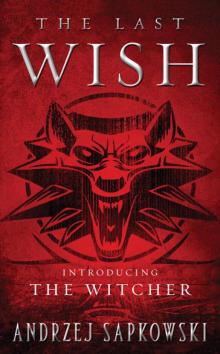 The Last Wish
The Last Wish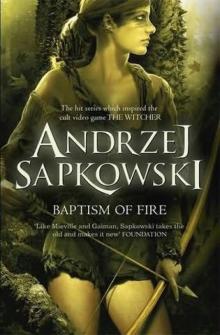 Baptism of Fire
Baptism of Fire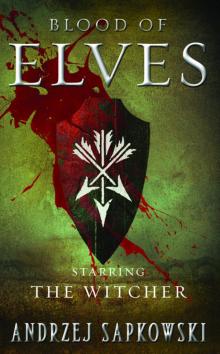 Blood of Elves
Blood of Elves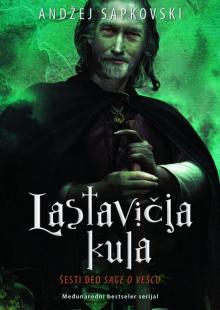 Lastavičja Kula
Lastavičja Kula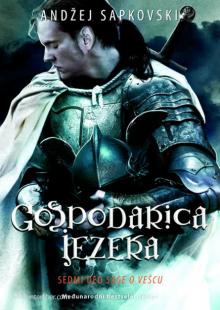 Gospodarica Jezera
Gospodarica Jezera Vatreno Krštenje
Vatreno Krštenje Sezona Oluja
Sezona Oluja Lady of the Lake
Lady of the Lake The Road With No Return
The Road With No Return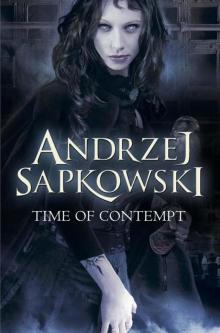 Time of Contempt
Time of Contempt Mač Sudbine
Mač Sudbine The Malady and Other Stories: An Andrzej Sapkowski Sampler
The Malady and Other Stories: An Andrzej Sapkowski Sampler The Saga of the Witcher
The Saga of the Witcher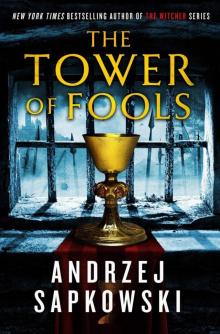 The Tower of Fools
The Tower of Fools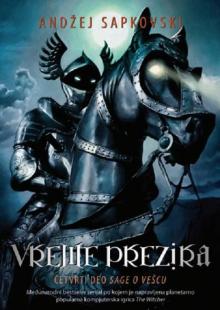 Vreme Prezira
Vreme Prezira Introducing the Witcher
Introducing the Witcher Stephen Hulin
Stephen Hulin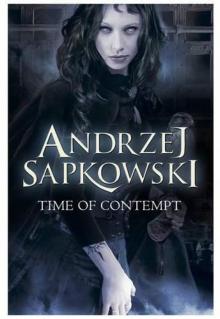 The Time of Contempt
The Time of Contempt The Sword of Destiny
The Sword of Destiny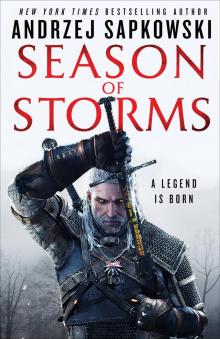 Season of Storms
Season of Storms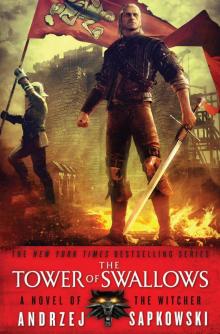 The Tower of Swallows
The Tower of Swallows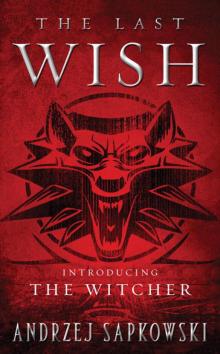 The Last Wish: Introducing The Witcher
The Last Wish: Introducing The Witcher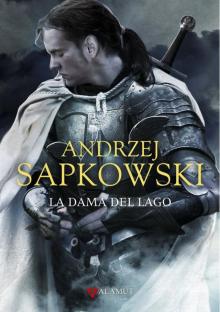 The Lady of the Lake
The Lady of the Lake